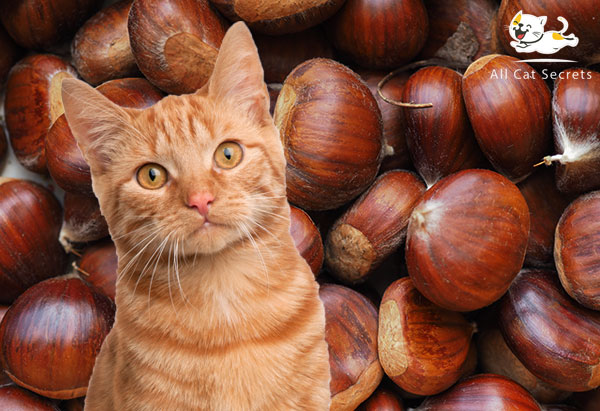The words ‘cats’ and ‘nuts’ seldom appear in the same sentence. And when they do, usually not in a positive light. That’s because many nuts are considered harmful to cats.
For instance, macadamia contains compounds known to cause toxicity in pets. The same is true for grapes and black walnuts. Most other nuts, such as pecans and almonds, are dangerously high in oils that could trigger a wide range of gastrointestinal complications.
Considering the negative relationship between cats and nuts, most cat owners are often apprehensive about giving their feline friends nut-containing foods. But does the potential toxicity of nuts for cats apply to chestnuts? Can cats have chestnuts?
The short answer is yes, cats can have chestnuts. Chestnuts do not contain any compounds deemed toxic for pets. These nuts also boast several vitamins and minerals that could benefit your kitto.
However, when it comes to cats and chestnuts (or any plant-based foods for that matter), the cardinal rule is to serve them in moderation. A few chestnuts pieces will unlikely harm your cat. But the situation can change dramatically if you feed these nuts to your cat in excess.
If you’re a proud cat owner and chestnuts lover who’s occasionally wondering whether you can share chestnuts with your adorable cat, this article is for you. Read on as we shine a light on the possible effects of chestnuts for cats.
Table of Contents
What Are Chestnuts?
Chestnuts are edible fruits that grow on deciduous trees of the same name.
Chestnut trees belong in the genus Castanea and in the beech family Fagaceae. The trees are native to the temperate climate of the Northern Hemisphere. But due to their demand, these trees are now cultivated in other climatic regions around the world.
There are various types of chestnuts. Common ones include the American chestnut, European chestnut, Chinese chestnut, Korean chestnut, and the Japanese chestnut. But despite their origin and subtle differences, all chestnut varieties share similar fundamental qualities.
The nuts from the chestnut tree are crunchy and bitter when consumed raw. However, these nuts are delectably sweet and buttery when roasted. Some people associate the taste of roasted chestnuts with that of cooked sweet potatoes.
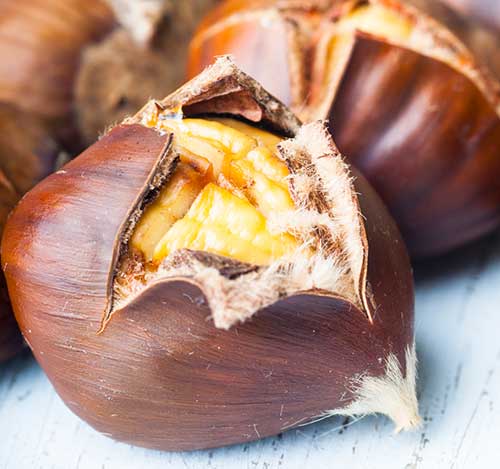
Another great thing to love about chestnuts is their remarkable versatility. You can incorporate these nuts into various dishes, including salads, soups, stuffings, to mention but a few.
Not only are chestnuts incredibly delicious. They can also provide several nutritional and health benefits.
But that’s as far as human consumption is concerned. The potential benefits of chestnuts for humans may not necessarily apply to our feline friends.
So, as a chestnuts-loving cat owner, it’s perfectly normal to find yourself wondering, are chestnuts okay for cats?
The following sections shall answer this question conclusively.
- Cat food with gravy, made without artificial colors or preservatives
- Purina Fancy Feast canned cat food variety pack crafted with real, high-quality ingredients, like real poultry or beef, to deliver...
- An irresistible, protein-rich Fancy Feast Gravy Lovers cat food taste offering a gourmet turkey, chicken or beef cat food meal...
Last update on 2024-09-25 / Affiliate links / Images from Amazon Product Advertising API
Potential Health Benefits of Chestnuts for Cats
An 84-gram serving (10 kernels) of raw, peeled chestnuts boasts the following nutritional value;
- Energy – 206 calories
- Water – 46.6 grams
- Carbohydrates – 44.5 grams
- Fiber – 4.3 grams
- Protein – 2.7 grams
- Fat – 1.9 grams
- Vitamin B1 (Thiamine) – 17% of the recommended daily value (RDV)
- Vitamin B2 (Riboflavin) – 11% of the RDV
- Vitamin B6 – 25% of the RDV
- Vitamin B9 (Folate) – 15% of the RDV
- Vitamin C – 24% of the RDV
- Copper – 47% of the RDV
- Manganese – 43% of the RDV
- Potassium – 11% of the RDV
The same serving of chestnuts also contains trace amounts of other essential minerals, including calcium, iron, magnesium, zinc, sodium, and antioxidants.
NOTE: The RDV values are based on human consumption. That begs the question, can cats also benefit from chestnuts?
The following are some of the potential health and dietary benefits of chestnuts for cats;
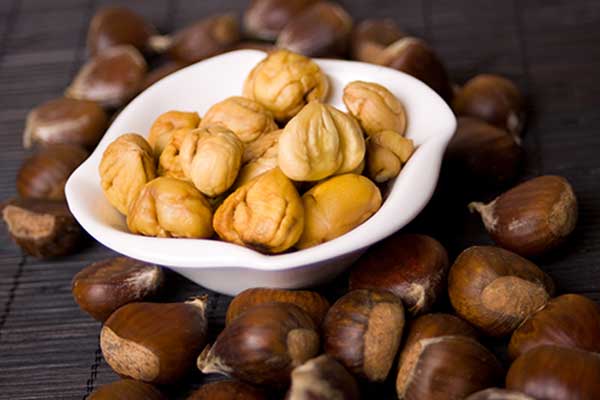
1. Chestnuts May Support Your Cat’s Digestion and Gut Health
An 84-gram serving of chestnuts contains as many as 4.3 grams of fiber or about 15% of the recommended daily value. Fiber is a significant nutrient required by humans. But it might benefit your feline friend too.
Fiber can help bulk up your cat’s stools. That makes it easier for the animal to empty his bowels. So, giving your cat small portions of chestnuts may help ease indigestion.
Fiber can also nourish your cat’s gut-friendly bacteria. These bacteria derive much of their nutrients by fermenting the fiber in an animal’s diet.
The fermentation process results in the production of various useful compounds, such as short-chain fatty acids. Studies have shown that short-chain fatty acids may support gut health by reducing inflammatory conditions like inflammatory bowel disease (IBD).
2. Chestnuts May Help Keep Your Cat’s Weight in Check
Not only can the fiber content in chestnuts aid digestion and gut health. It may also be useful in keeping your cat’s weight in check.
Fiber contributes to sensations of fullness. Mixing chestnuts into your cat’s regular food will help reduce the meal portions your kitto can finish in a single sitting. That’s instrumental in weight management.
Besides, nearly half the total mass of raw chestnuts is made up of water. Water is also noted for its remarkable filling effect. Therefore, it can work synergistically with fiber to help manage your cat’s weight by cutting back on the amount of food the animal can consume at once.
- Works as a dog food topper - For pet parents looking for an alternative to capsules, raw treats, or soft chews, all it takes is a...
- A tasty & body nourishing treat for cats & dogs - Essential fatty acids for a healthy coat.
- Powerful Omega Fatty Acids - This premium fish oil liquid formula is loaded with the healthy Omega-3 fatty acid (with epa and dha)...
Last update on 2024-09-25 / Affiliate links / Images from Amazon Product Advertising API
3. Chestnuts May Support Your Cat’s Heart
Chestnuts are a rich source of potassium. The mineral plays an instrumental role in managing a healthy heart.
Potassium-rich diets like chestnuts may help regulate blood pressure. Studies also associate the mineral with reduced risks of strokes and heart disease.
4. Chestnuts May Boost Your Cat’s Immunity
Chestnuts are high in vitamin C, a vitamin known for its antioxidant properties. In fact, chestnuts are among the only few nuts that are exceptionally loaded with vitamin C.
As with any antioxidant, vitamin C can boost your cat’s immunity by neutralizing the negative effects of free radicals in the animal’s body cells.
Other common antioxidants in chestnuts include;
- Gallic acid
- Ellagic acid
- Alkaloids
- Polyphenols
- Tannins
- Lutein
- Zeaxanthin
The last two antioxidants are particularly noted for their role in supporting vision.
- Natural prebiotic fiber, sourced from chicory root, helps promote digestive health
- High protein formula with real chicken as the first ingredient
- Fortified with live probiotics to support digestive and immune health
Last update on 2024-09-25 / Affiliate links / Images from Amazon Product Advertising API
The following are additional potential benefits of chestnuts for cats, based on the other compounds in these nuts.
- Vitamin B1 – May improve brain function by improving memory and concentration.
- Vitamin B2 – May boost energy synthesis by supporting metabolism.
- Vitamin B9 – May aid the production of red and white blood cells, as well as the synthesis of DNA and RNA.
- Copper – Works synergistically with iron in the manufacture of red blood cells, while also helping to maintain healthy bones, nerves, and blood vessels.
Are Chestnuts Safe For Cats?
Chestnuts do not contain chemicals known to trigger immediate toxicity in cats. And based on the above-reviewed health benefits, these nuts may actually serve as an excellent treat for your feline companion.
However, there are several things to bear in mind before feeding chestnuts to your cat. Although safe in small amounts, chestnuts can prove harmful if overeaten.
Possible Adverse Effects of Chestnuts for Cats
Chestnuts may be loaded with vitamins and minerals. But the fact that these nuts are essentially plant-based foods makes them potentially harmful to cats.
Note that cats are obligate carnivores. Their digestive system is designed to process animal-derived products, particularly lean meat. While cats can snack on fruits, nuts, and vegetables occasionally, these foods should never replace their natural diet of animal protein.
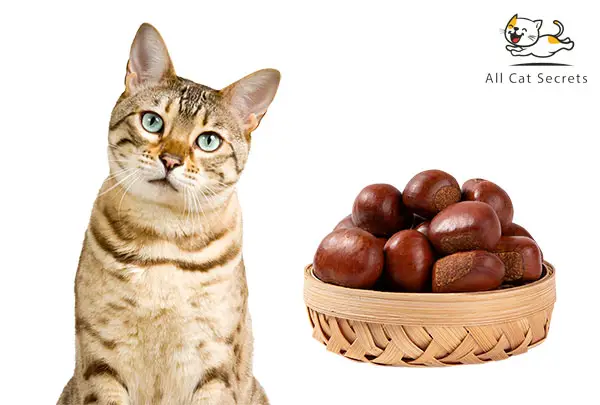
Since cats should thrive on meat as opposed to plant-based foods, giving them chestnuts might trigger stomach irritation. Common side effects to watch out for include nausea, vomiting, diarrhea, gassiness, and abdominal pain. The severity of these adverse effects depends on factors like;
- Age
- Size
- Previous exposure to chestnuts
- General health condition
- The quantities served
That begs the question, can kittens eat chestnuts?
Kittens can eat chestnuts in moderation. But you should probably consider other safer alternatives. That’s because a kitten’s stomach is more sensitive than that of mature cats, hence more susceptible to irritation.
In terms of size, smaller cat breeds may experience more devastating effects of chestnuts than their larger counterparts. Also, cats consuming chestnuts for the first time may exhibit more severe symptoms than those already exposed to these fruits.
When it comes to the general health condition, cats with suppressed immunity shouldn’t eat chestnuts. That applies to sick cats, older cats, pregnant cats, and nursing cats.
Last but not least, the severity of the effects of chestnuts in cats will increase depending on the portions consumed.
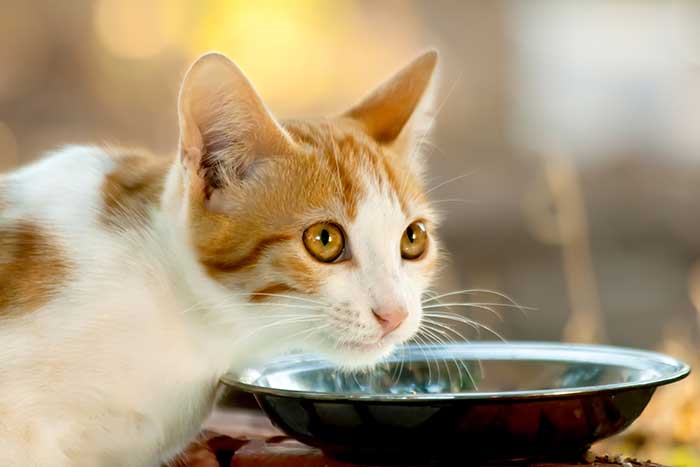
If you’ve always wondered, ‘how many chestnuts can cats eat,’ the answer depends on the five major factors we’ve highlighted above.
Besides not being part of a cat’s staple diet, chestnuts may also be dangerously high in fats and sodium. This is usually a problem with processed chestnuts.
Both fats and sodium are potentially harmful to cats.
High fat consumption may trigger diarrhea and weight gain, in addition to worsening the symptoms of obesity, heart disease, and pancreatitis.
Sodium, on the other hand, could cause sodium-ion poisoning, a deadly feline disease that generally produces kidney-related symptoms. It’s precisely for that reason that cats with kidney disease shouldn’t consume chestnuts.
So, are chestnuts poisonous to cats?
If you’re still wondering, ‘are chestnuts toxic to cats,’ it’s important to point out that chestnuts may not be immediately poisonous to cats. But overconsumption of these nuts could trigger life-threatening side effects.
- IMMUNE SUPPORT: Human grade for pets. Daily Lysine supplement provides essential amino acids to help support a strong immune...
- EXTRA SERVINGS: 8 oz container = 300 One-Scoop Servings or 150 Two-Scoop Servings. Enough for 5-10 months. Won’t expire.
- ALL NATURAL: Fend off sneezing, runny eyes, and upper respiratory infections with natural immune system support.
Last update on 2024-09-24 / Affiliate links / Images from Amazon Product Advertising API
How to Feed Your Cat Chestnuts
So far, we’ve reiterated the importance of serving chestnuts to cats in moderation. But there’s also the dilemma of giving your cat raw or cooked chestnuts.
Can cats eat raw chestnuts?
Cats can eat raw chestnuts. All you need to do is rinse the nuts in clean water then slice them into small portions to minimize choking hazards. However, raw chestnuts may prove difficult for a cat’s body to break down. Which begs the question, can cats eat cooked chestnuts then?
If you must feed chestnuts to your cat, insist on cooking the nuts first. Cooking softens chestnuts, making them easier for your cat to digest. Just be sure not to add salt, fat, spices, or other ingredients considered toxic for pets.
Also, note that there are several ways to cook chestnuts for cats. You can boil, steam, or roast the nuts.
Perhaps you might have wondered, can cats eat roasted chestnuts?
Roasted chestnuts are safe for cats provided that they’re free from salt, fat, and spices. If you fear that roasting may destroy some of the minerals in chestnuts, you might consider boiling or steaming the nuts.
Other Frequently Asked Questions Regarding Cats and Chestnuts
Can cats eat water chestnuts?
Common chestnuts are not taxonomically related to water chestnuts (Eleocharis dulcis). The latter is a type of aquatic vegetable popularly consumed in Asia. That said, water chestnuts have a higher water content than standard chestnuts and are safe for cats too.
Can cats eat sweet chestnuts?
Cats can eat sweet chestnuts in moderation. Excess consumption could cause blood sugar spikes.
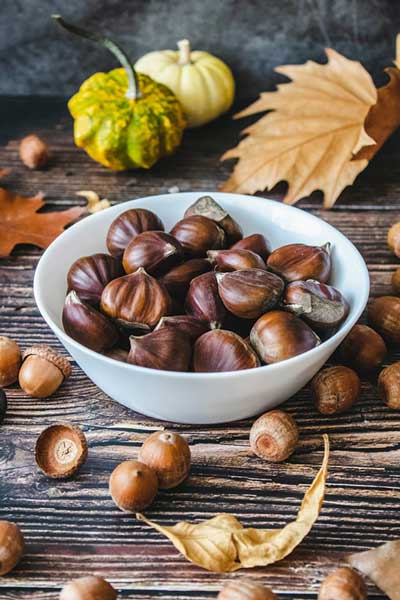
Are horse chestnuts poisonous to cats?
Horse chestnuts are not toxic to cats if fed in moderation.
Conclusion: Can Cats Eat Chestnuts?
Cats can eat chestnuts in moderation. These nuts do not contain any toxic chemicals.
But like most nuts, chestnuts can be high in fat and sodium (especially processed chestnuts). Excess consumption of fatty or salty foods may trigger severe health complications.
Besides, chestnuts are plant-based foods and cats should consume diets high in animal protein. That underscores the importance of feeding chestnuts to cats in moderation and only as an occasional treat.
Checkout Our Favorite Cat Products
1. Best Online Course For Cat Parents
Our favorite: The Cat Language Bible (How to Finally Understand And Speak to Your Cat) – A new form of cat to human communication that many cat owners have dreamed about… but few have actually thought possible.
2. Best Immune Support For Cats
Our favorite: Tomlyn Immune Support – Best Supplement for Cats and Kittens.
3. Best Cat Treats
Our favorites: LIFE ESSENTIALS All Natural Freeze Dried Chicken And Sheba Meaty Tender Sticks – Both are Great.

